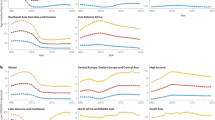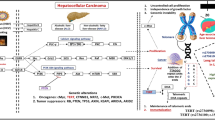Abstract
Telomerase is highly activated in human immortal cell lines and tumor tissues, whereas it is not activated in primary cell strains and many tumor-adjacent tissues. It is suggested that telomerase activation is one of the critical steps in malignant transformation. In the present study, the telomerase activity was investigated in hepatocellular carcinoma tissues and non-tumor liver tissues from Korean patients with chronic hepatitis and cirrhosis. Eighty two liver tissues (24 chronic hepatitis specimens, 34 cirrhosis specimens, and 24 hepatocellular carcinomas) were obtained from 23 chronic viral hepatitis patients, 19 cirrhosis patients (including 7 liver transplants), and 24 patients with hepatocellular carcinoma, of which the surrounding non-tumor liver tissues were available in 16 patients (1 chronic hepatitis and 15 cirrhosis). As negative controls, 3 normal liver tissues were included. Protein from liver specimens was purified by a detergent lysis method as described elsewhere, and telomerase activity was measured in 2 diluents of each sample (1:1 and 1:100) by a telomeric repeat amplification protocol (TRAP). Telomerase was strongly activated in 79% (19/24) of the hepatocellular carcinomas, while weakly in 8% (2/24) of the chronic hepatitis tissues and in 24% (8/34) of the cirrhosis tissues. All of 3 normal control livers showed no telomerase activation. No relationship could be observed between the enhancement of telomerase activity and tumor nature. None of the chronic heaptitis or cirrhosis patients with mild telomerase activation in the liver have developed hepatocellular carcinoma for at least 2 years of follow-up period. These results suggest that the strong enhancement of telomerase activity may be a critical part of hepatocarcinogenesis, although the exact mechanism of such high activation in hepatocellular carcinoma is not clear. In addition, further study will be necessary to clarify the reason why no telomerase activity detectable by a conventional TRAP can be seen in some hepatocellular carcinoma.
Similar content being viewed by others
Article PDF
Author information
Authors and Affiliations
Rights and permissions
This is an Open Access article distributed under the terms of the Creative Commons Attribution Non-Commercial License (http://creativecommons.org/licenses/by-nc/3.0/) which permits unrestricted non-commercial use, distribution, and reproduction in any medium, provided the original work is properly cited.
About this article
Cite this article
Park, Y., Choi, J., Byun, B. et al. Telomerase is strongly activated in hepatocellular carcinoma but not in chronic hepatitis and cirrhosis. Exp Mol Med 30, 35–40 (1998). https://doi.org/10.1038/emm.1998.5
Published:
Issue date:
DOI: https://doi.org/10.1038/emm.1998.5
Keywords
This article is cited by
-
Estimation of telomerase, AFP, and AFP-L3 levels in Sudanese patients with hepatocellular carcinoma and chronic liver diseases
Comparative Clinical Pathology (2018)
-
Telomerase Activity in Tumor and Remnant Liver as Predictor of Recurrence and Survival in Hepatocellular Carcinoma after Resection
World Journal of Surgery (2007)



